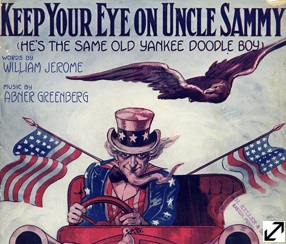
1914-1917 Conflict in Europe - America's Business
Good-Bye Broadway, Hello France, 1917
Lyrics by C. Francis Reisner and Benny Davis (1895-1979)
Music by Billy Baskette (1884-1949)
Published by Leo. Feist, Inc.
Greenwich Historical Society, William E. Finch, Jr. Archives
This song was first introduced in the stage musical The Passing Show of 1917. From 1912 to 1924 Lee and Jacob Shubert produced elaborate productions designed to compete with the Ziegfield Follies. Initially the songs reflected the President's and Congress's isolationist position but by 1917 it included lyrics like "learn to shoot for your Uncle Sammy" in Johnny Get Your Gun and "now that we have the chance we'll pay our debt to France" in Good-Bye Broadway, Hello France.
I Didn't Raise My Boy to Be a Soldier, 1915
Lyrics by Alfred Bryan (1871-1958)
Music by Al Piantadosi (1882-1955)
Published by Leo. Feist, Inc.
Lent by Stefanie Kies
This was the first anti-war song to enjoy widespread popularity, so much so that it inspired both imitations as well as parodies such as I Did Not Raise My Boy to Be a Coward and I Didn't Raise My Boy to Be a Soldier, But I'll Send My Girl to Be a Nurse. Theodore Roosevelt remarked that "foolish people who applaud a song entitled I Didn't Raise My Boy to Be a Soldier are just the people who would also applaud a song entitled I Didn't Raise My Girl to Be a Mother." Written between the establishment of the first relief efforts for Belgium and the sinking of the Lusitania, it sold 650,000 copies in the first three months.
Keep Your Eye on Uncle Sammy, 1914
Lyrics by William Jerome (1856-1932)
Music by Abner Greenberg (1889-1959)
Published by Maurice Richmond Music Co.
Lent by Stefanie Kies
The cover design by André De Takacs reflects the song's lyrics - the desire for peace but the willingness to fight. Uncle Sam "came to town riding in a motor." He is "willing to fight for a cause that is right" but "his love for peace you can't destroy." The song was recorded by the Peerless Quartette on July 8, 1914, 20 days before Austria-Hungary declared war on Serbia.
I Didn't Raise My Boy To Be A Soldier
In 1914 most Americans did not want to become militarily involved in what they viewed as a European dispute. Progressives wanted to focus on political and social reform in the United States. For many Americans, isolationism was a strongly held belief. Immigrants who had come to the United States to escape the harsh, mandatory military service prevalent in Europe had no interest in returning to wage war. Americans of Germanic and Austrian heritage did not want to combat friends and relatives back home. While the Irish were fighting the English for independence, Irish-Americans were not eager to lay down their lives for England. In 1916 Americans reelected President Wilson who campaigned under the slogan, "He Kept Us Out of War."
Between 1915 and 1918, the "about-face" in American public opinion from nonintervention to a strong pro-war embrace can be seen in popular music.



